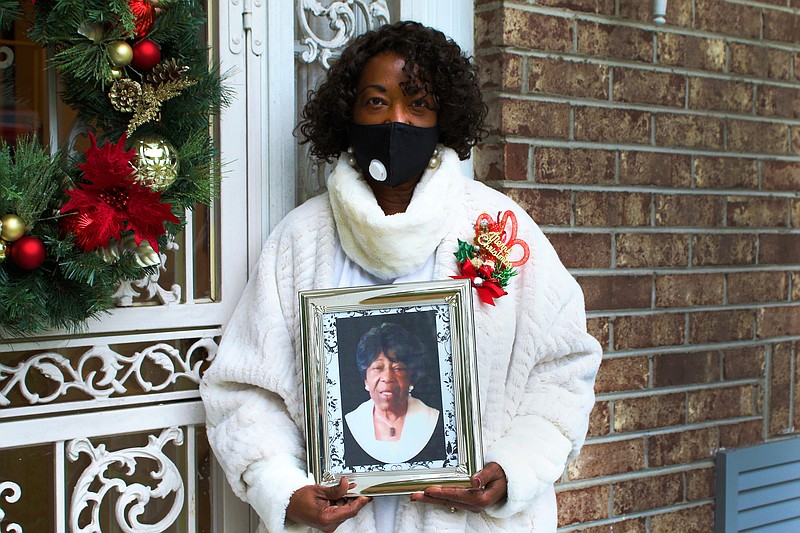The plan was that it would be for just a few days. That is what Liz Cooper thought when she placed her mother in a long-term care facility. Cooper was sick with a sinus infection and needed someone to look after her mother, who developed dementia nearly a decade earlier.
Cooper arranged for her mother, Mildred Jean Williams, to stay at The Health Center at Standifer Place for an emergency respite on March 13.
"I thought it was just going to be for that weekend," Cooper said. "But then Monday came, the 16th of March, and I had to make a decision whether to leave her there or bring her home. And, due to the advanced stage of her condition, I thought it might be better for her to be there because she would be around people and could socialize."
After the first confirmed coronavirus case was announced March 13, Hamilton County quickly went into lockdown. When there were fewer than 20 confirmed cases in the community, Gov. Bill Lee declared a state of emergency on March 12 and later ordered non-essential businesses to close. People were sent to work at home and health care facilities tightened visitation policies.
Cooper could have pulled her mother out of the facility, but that would have meant Cooper would become the full-time caretaker. Because of the pandemic, her mother would be forced to stay at home, unable to socialize with others or attend the day facility she previously frequented. Besides, Cooper said, her mother was receiving good care and was happy there.
Her mother stayed in the facility. Cooper still wonders whether that was the right decision.
"It's a very isolating and heartbreaking feeling to be separated from someone you love and care about and yet I have placed blame and guilt on myself for her being there," Cooper said.
Help us continue this reporting
The Times Free Press is continuing its coverage of the impact of COVID-19 on local families with loved ones in long-term care facilities. If you would like to be part of our reporting, please contact the reporter at wmassey@timesfreepress.com or 423-757-6249.
Long-term care facilities are among the institutions hardest hit by the coronavirus pandemic. Earlier this month, case rates in such facilities were 26 times higher than the wider county population. Residents of these facilities have weaker immune systems and more underlying health issues than the general population, placing them at greater risk of serious illness or death if exposed to the virus.
Williams got sick in mid-November, though she did not show many symptoms, Cooper said. Williams died on Nov. 30 at 82 years old.
Since March, 241 Hamilton County residents have died from COVID-19, according to the Hamilton County Health Department. The first few weeks of December were the deadliest to date and so far 83 people have died in December, making it already the deadliest month for the virus. Of those who have died from the virus 135 have been men and 106 women; 149 white residents, 74 Black residents, three Asian residents, five listed as "other" and 10 residents with their race undetermined.
Despite Cooper calling almost every day, she only saw her mother in person twice after March, once in April and once in October. Suddenly, she was gone. Like thousands of Americans, Cooper never got the closure of being at her mother's side in her final moments.
"It's like it's not real. I think because she wasn't physically here in the house, that's maybe why I can't seem to think that it's real," Cooper said. "I think about her all the time and see her face all day in everything I'm doing."
The days since Williams's death have been busy. Cooper had to organize the funeral arrangements in Chattanooga and the burial arrangements in North Carolina. Her family was flooded with phone calls and cards. The seemingly never-ending to-do list has kept the weight of the loss at bay, Cooper said. She has not cried as much as she expected, but she knows it is coming.
"I'm still trying to feel normal," she said. "I don't even know if I know what normal is anymore. I'm wondering how I'm going to go on not having mom."
Cooper leans on her faith these days, especially during the sadness when her mind circles around the what-ifs. What if she had pulled her mother from the facility? What if her mother could have stayed safe long enough to be vaccinated? Residents of long-term care facilities are at the top of the list alongside health care workers as the recently approved vaccine arrives in Tennessee.
"My faith will sustain me and God will help to heal my sorrow and my grief," she said.
Contact Wyatt Massey at wmassey@timesfreepress.com or 423-757-6249. Follow him on Twitter @news4mass.
